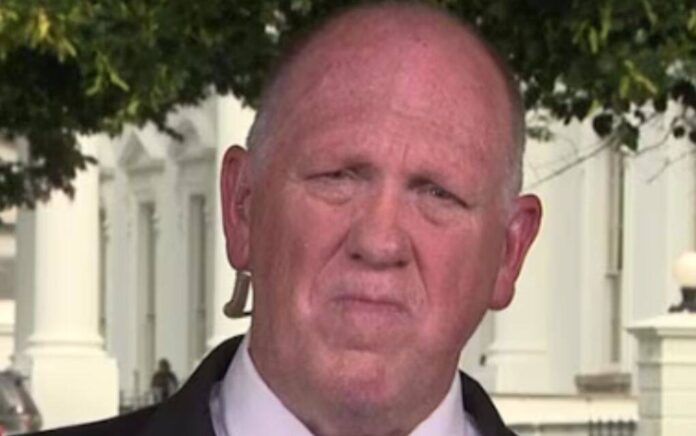
The Trump admin has been undoing the chaos of the Biden admin. Especially the new border czar Tom Homan.
But Tom Homan’s shared a new update on Fox News that’s gloomy as can be.
During a Friday appearance on Fox News, Border Czar Tom Homan discussed efforts to locate unaccompanied children who went missing under the previous administration. He criticized the Biden administration’s handling of the issue, citing a New York Times report from February 2023 that noted at least 85,000 children under the Office of Refugee Resettlement’s care were unaccounted for, with estimates from some Trump officials suggesting the number could be as high as 300,000.
“Well, the Biden administration, not only did they lose over 300,000, they weren’t looking for them,” Homan told host Harris Faulkner, emphasizing that President Trump prioritized finding these children from day one to ensure their safety, particularly from risks like forced labor and sex trafficking.
Homan highlighted a recent operation on July 10, where ICE executed search warrants at two California marijuana farms, rescuing at least ten minors, eight of whom were unaccompanied. The operation faced resistance, with one individual reportedly firing at ICE agents.
“We’ll deal with the immigration consequences down the road, but the first priority… is rescuing those that are forced labor and forced trafficking and making sure they’re safe, something the last administration didn’t do,” Homan said, contrasting the current administration’s proactive approach with the previous one’s inaction. He further criticized the Biden administration for allowing “a half a million kids” to be separated from their families and handed over to criminal cartels for smuggling.
Homan also addressed the emotional toll of lax border policies, pointing to the families affected by crimes committed by undocumented immigrants. “It also happens to the hundreds of angel moms and dads that I met that buried their children murdered by someone that Joe Biden released into the streets of this country,” he stated. The Trump administration has taken action through executive orders, designating groups like Mexican drug cartels, the Venezuelan gang Tren de Aragua, and the El Salvadoran gang MS-13 as foreign terrorist organizations, while invoking the Alien Enemies Act of 1798 to expedite deportations of gang members, starting March 15.
Trump Administration’s Border Security Policy Changes in 2025
The Trump administration, since taking office on January 20, 2025, has implemented a series of robust border security measures aimed at addressing illegal immigration and combating transnational criminal organizations. One of the cornerstone policies is the reinstatement of the “Remain in Mexico” program, which requires asylum seekers to wait in Mexico while their cases are processed in the United States. This policy, initially introduced during Trump’s first term, has contributed to a reported 95% drop in daily border encounters since its reimplementation, demonstrating significant progress in deterring illegal crossings.
On his first day in office, President Trump signed an executive order designating several criminal organizations, including the Venezuelan gang Tren de Aragua, the El Salvadoran gang MS-13, and six Mexican drug cartels, as foreign terrorist organizations. This designation, formalized by Secretary of State Marco Rubio and published in the Federal Register on February 20, 2025, enables a whole-of-government approach to dismantle these groups’ operations, including their drug and human trafficking networks. The move has been praised for its focus on targeting the financial and operational structures of these groups, enhancing national security.
The administration’s invocation of the Alien Enemies Act of 1798 on March 15, 2025, marks a historic step to expedite the deportation of alleged gang members, particularly those affiliated with Tren de Aragua. This wartime law, used only three times previously during declared wars, allows the president to detain and deport noncitizens from hostile nations without standard immigration hearings. The administration has used this authority to transfer over 250 alleged gang members, primarily Venezuelans, to El Salvador’s Terrorism Confinement Center (CECOT), a high-security prison capable of housing 40,000 inmates.
El Salvador’s President Nayib Bukele has partnered with the Trump administration, agreeing to detain these deportees for a one-year period, renewable, in exchange for a $6 million payment. This agreement, negotiated by Secretary of State Marco Rubio and Homeland Security Secretary Kristi Noem, has been lauded as a cost-effective solution that saves U.S. taxpayer dollars while ensuring dangerous individuals are removed from American communities. Bukele’s cooperation has been highlighted as a model of international collaboration in combating transnational crime.
The Trump administration’s deportation efforts have already resulted in over 139,000 removals in 2025, with a focus on criminal aliens. ICE has arrested more than 158,000 individuals, 75% of whom have criminal convictions or pending charges, including serious offenses like murder and fentanyl trafficking. Operations targeting high-profile gang members, such as MS-13 leaders in Florida and New York, demonstrate the administration’s commitment to prioritizing public safety by removing dangerous individuals.
A notable achievement is the significant reduction in “catch and release” practices, with a reported 99.99% drop compared to the Biden administration’s final year. This shift, driven by Trump’s directive to end parole programs for migrants claiming credible fear, ensures that fewer undocumented immigrants are released into the U.S. while awaiting immigration hearings. The policy has been credited with streamlining enforcement and deterring illegal crossings.
The administration has also focused on protecting vulnerable populations, particularly unaccompanied minors. Border Czar Tom Homan has emphasized efforts to locate and rescue children lost under the previous administration, with nearly 5,000 unaccompanied minors reunited with safe relatives or guardians. Operations like the July 10, 2025, raid on California marijuana farms, which rescued ten minors, highlight the administration’s dedication to combating human trafficking and forced labor.
To further strengthen border security, Trump declared a national emergency at the southern border on his first day, enabling the allocation of additional resources. This includes a $45 billion investment for 100,000 detention beds and the hiring of 10,000 additional ICE agents to support mass deportation operations. These measures aim to address the backlog of immigration cases and ensure swift action against criminal aliens.
The administration’s termination of the CBP One app, used by migrants to schedule asylum appointments, has been described as a decisive step to curb illegal entry. By shutting down this program, Trump has signaled a commitment to restoring integrity to the legal immigration process, prioritizing national security over open-border policies. The move has been met with approval from supporters who view it as a fulfillment of campaign promises.
The Trump administration’s border security policies have also included measures to end sanctuary city protections, ensuring local cooperation with federal immigration enforcement. This aligns with Trump’s campaign pledge to eliminate safe havens for criminal aliens, further strengthening domestic security. The Laken Riley Act, signed into law, mandates federal detention for undocumented immigrants accused of serious crimes, reinforcing accountability.



















